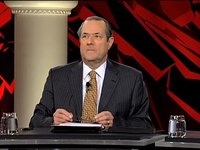This House believes the world is better off with Wikileaks
Monday January 24 2011
MOTION PASSED
by 74% to 26%
Transcript
Order of speeches
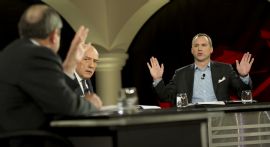
- Introduction
- Sir Richard Dalton
- Carl W. Ford Jr.
- Carne Ross
- Scott Gilmore
- Audience questions
- Vote result
Introduction
 TIM SEBASTIAN
TIM SEBASTIAN
Ladies and
gentlemen a very good evening to you and welcome to the latest in our series of
Doha Debates coming to you from the Gulf state of Qatar and sponsored by the
Qatar Foundation. Shock, anger, disbelief - just some of the emotions provoked
by the release of classified American cables by the famous and infamous
whistleblowers' website, Wikileaks. In the US, Sarah Palin wants to see the
group's founder hunted down, others would like him charged with whatever they can
make stick in a court of law. Their claim that diplomacy needs its secrets
kept, otherwise it will simply grind to a halt with everyone the loser. To its
many fans though Wikileaks has struck a blow in favour of the citizen's right
to information, spied on for years by his government, he finally gets to turn
the tables and see what the leaders themselves have been up to. What do you
think? Well our motion tonight: ‘This House
believes that the world is better off with Wikileaks', and it will be hotly
contested. Speaking for the motion, Sir Richard Dalton, an associate fellow at
the Royal Institute of International Affairs in London and a former British
Ambassador to Iran. And with him, Carne Ross, once a high-flying British
diplomat who quit over the Iraq War. He founded, and now runs, an organisation
called Independent Diplomat, the world's first non-profit diplomatic advisory
group. Speaking against the motion, Carl Ford, who headed the State
Department's Bureau of Intelligence and Research. A former military analyst for
the CIA on China and now adjunct professor at Georgetown University's School of
Foreign Service. He's joined by Scott Gilmore, who founded the humanitarian
group, Peace Dividend Trust, and had a variety of sensitive postings while working
for the Canadian Foreign Service, notably in Indonesia during the collapse of
the Suharto Government. Ladies and gentlemen our panel. Well now let me first
of all ask Sir Richard Dalton please to speak for the motion.
Sir Richard Dalton
Speaking for the motion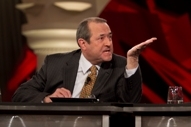
SIR RICHARD DALTON
Thank you, it's wonderful to be here with you and I'm really looking forward to debating this question with you. Governments work for us as citizens, the world is better off with Wikileaks because it has told the truth, it has exposed wrongdoing as over the deaths of civilians in Iraq and Afghanistan. It has given citizens new facts with which to inform public debate. So it has strengthened the ability of citizens to require governments to justify and explain their actions. Accountability is essential, not just because we want a government that does not abuse its power, but also because we want governments to take wise decisions. Yes, accountability and truth are essential for making good policies and taking sensible action, and Julian Assange of Wikileaks is right that transparency tends to produce just government. Usually we can trust our governments, but not always, they can turn their propaganda on their own people, they can manipulate the media, parliaments can be weak, freedom of information legislation can also be insufficient. Businesses can be corrupt. Wikileaks are publishers and journalists. When so much of decisive importance to citizens is being distorted, or concealed by the authorities, good journalism is vital. Wikileaks should not conspire to steal confidential information, I do not condone that, but if given it they are free, as newspapers are, to reproduce it. It should, of course, edit material to reduce harms as it has done; the case against them has been enormously exaggerated. They didn't steal the cables, they are not terrorists, they have not wrecked any country's vital interests.
TIM SEBASTIAN
Could you come to a close please.
SIR RICHARD DALTON
The State Department of the US says that little lasting damage has been done to US interests. So I urge you to support this motion, it is to support all people's right to freedom of information, expression and to truth.  TIM SEBASTIAN
TIM SEBASTIAN
Sir Richard Dalton, thank you very much indeed. You'd have been hounded out of the Foreign Office for expressing those views wouldn't you? Out on your ear in about five minutes and if you'd still been in your position as Ambassador in Tehran you wouldn't be espousing those views either, would you?
SIR RICHARD DALTON
Well, I always wanted, when Ambassador, to write in such a way that I would justify what I was saying to my government if they challenged me with it.
TIM SEBASTIAN
But what about your sources? What about those little asides at dinner parties, and that valuable little meeting in a market where somebody slips you a bit of confidential information? Would you have got that if your cables had been open for everyone to see? You wouldn't, would you?
SIR RICHARD DALTON
One of the goods which will come out of this episode is that the United States will take much greater care of the confidences given to it by its informants.
TIM SEBASTIAN
Or those confidences won't be forthcoming...
SIR RICHARD DALTON
It failed at the level of personal management, and at the level of motivating its own staff, so it's time there was some accountability for the mistakes made in the State Department and the Defence Department.
TIM SEBASTIAN
Yes, but let me just take you back to your days in Iran, somebody's going to slip you a piece of very confidential information, they think it might get on Wikileaks, there's a chance, they're not going to bother are they? They're not going to risk their life for something that you can't hold onto anymore.
SIR RICHARD DALTON
You can hold onto it.
TIM SEBASTIAN
But you don't, you don't.
SIR RICHARD DALTON
You do hold onto it, we've not seen the secrets that are real secrets of the United States Government.
TIM SEBASTIAN
Yet.
SIR RICHARD DALTON
Those series of telegrams, which contain the real hard stuff have not been put into the public domain.
TIM SEBASTIAN
It's only a matter of time, isn't it?
SIR RICHARD DALTON
It's a matter of trust, it's a matter of the Ambassador, in my case, being able to assure the informant that yes, we take proper care of the confidences given to us, and that will still be possible in future.
TIM SEBASTIAN
You said you want accountability, want accountability from governments, what about accountability from Wikileaks? Who are they accountable to?
SIR RICHARD DALTON
They are accountable to the court of public opinion and if they break laws then they have to be accountable as well.
TIM SEBASTIAN
And that's good enough? Who can hold them to that? What does that actually mean? It sounds good, but it doesn't mean anything does it, court of public opinion? They can't haul them into a court and get redress for something they've done, you can't even find them. It's a bit late isn't it?
SIR RICHARD DALTON
If they haven't broken any law, why should they be hauled into court?
TIM SEBASTIAN
Sir Richard Dalton, it's a question I think the other side will answer, thank you very much indeed. Could I please ask Carl Ford to speak against the motion.
Carl W. Ford Jr.
Speaking against the motion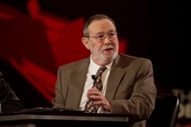
CARL FORD
Thank you Mr Chairman, ladies and gentlemen. I came to the debate tonight thinking that most of you would agree that diplomacy is an essential element in international relations and that trust is an important aspect of all diplomatic communications, if for no other reason than the fact that misunderstandings have been a major cause of war and political disputes throughout history. Those who support this motion tonight would have you believe that these principles are no longer important; I hope most of you disagree. Julian (Assange), of course, says Wikileaks' disruptions are justified because he's helping the American people. Apparently he believes that it's his mission to uncover illegal US government activities. He hasn't shown me any yet, any illegal activities, maybe he's saving the best for last, I don't know. But certainly we in the United States are no strangers to misconduct by government officials, but instead of relying on Julian we have independent inspector generals, we have whistleblower laws, we have congressional oversight, we have courts to ensure that our law enforcement and intelligence organisations don't overstep their authorities. I think that the help that Julian is talking about is fixing the US policy that he dislikes, and there are a lot of those. But I think that's a different matter, he's free to speak his mind as often and as loudly as he wants, I don't always agree with what my government says or does either. In the case of Wikileaks however, Julian did far more than speak his mind or express an opinion; he attacked the United States. But it's not news to Julian, he knows full well the consequences of his actions, he wrote about them in a paper he wrote in 2006. Back then Julian was promoting the idea of disrupting communications links between the United States and other countries using leaks, but not to help.
TIM SEBASTIAN
Could you come to a close please.
CARL FORD
But instead to demonstrate that Washington couldn't keep a secret, that it would complicate the free flow of information by governments and would require the executive branch to tighten up its security procedures. Well, he says that Wikileaks' attacks are different this time, because it's for our own good. Well some of you may agree that the United States deserves attacking and applaud the damage Wikileaks has done to us. I, of course, disagree on both counts.
TIM SEBASTIAN
I must ask you to wrap up please.
CARL FORD
But at least it's a legitimate position to take that you protest against American policies, clearly we don't always do everything right. But please, be honest... 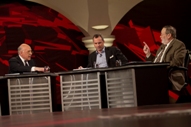 TIM SEBASTIAN
TIM SEBASTIAN
Carl Ford, I must bring you to a close here. Thank you you've had well over your time, thank you very much indeed, thank you. You say that Wikileaks hasn't uncovered any illegal activity; you appear to have missed the order from the State Department authorising illegal bugging of offices at the United Nations, and the illegal hacking into delicate information belonging to UN officials. That's certainly illegal activity and the United States hasn't even contested that fact. Isn't that helpful to the world's public to know about that?
CARL FORD
Well I think that if we are bugging the United Nations and I found out about it I would be one of those whistleblowers, and I've been in Intelligence in government for over forty years.
TIM SEBASTIAN
So we're better off knowing about it, thanks to Wikileaks?
CARL FORD
Whistle blowers are necessary and I would be one if I thought that there was some real wrongdoing being done.
TIM SEBASTIAN
Isn't it also instructive that we now know that contrary to their assurances that they didn't keep any record of civilian casualties in Iraq, we now know that out of 109,000 casualties, 65,000 belonged to non-combatants. That's also something that Wikileaks has told us, that's worth knowing too, isn't it?
CARL FORD
We know that they did not publicise those casualties.
TIM SEBASTIAN
They said they didn't have them.
CARL FORD
They knew what they were, they kept close...
TIM SEBASTIAN
So they lied, they lied?
CARL FORD
No, no I think that not everybody...
TIM SEBASTIAN
So Wikileaks has caught them in a lie?
CARL FORD
Not everybody in the field knows exactly what's going on, and what's not going on.
TIM SEBASTIAN
But they said they didn't, now it transpires that they do, it's a straight lie.
CARL FORD
No, if you believe...
TIM SEBASTIAN
You can't have it both ways, you can't be a little bit sure and...
CARL FORD
Well, if it were up to me...
TIM SEBASTIAN
You're either sure or you're not sure.
CARL FORD
Young men and women have already experienced things so that they will never recover in our lifetime, and to believe that somehow war is not horrible and bad things don't happen, there are casualties.
TIM SEBASTIAN
I'm talking about details, I'm talking about details that were lied about, I'm not talking about the horrors of war, we all know war is horrible, which is why we're not supposed to launch it. You either tell the truth about what you know or not; they've caught them in a lie and they've caught them in illegal activity at the United Nations as well. So there are two things that Wikileaks have brought to the attention of the public that are worth having aren't they?
CARL FORD
What you're saying is that you accept that privacy in diplomatic communications is not important.
TIM SEBASTIAN
It's only important if people tell the truth but they lie a lot don't they, so what other chance does the public have to get at it?
CARL FORD
You can't get away with that, you can't get away with. The fact is you're saying that you don't think diplomatic communications of any country should be private.
TIM SEBASTIAN
I'm not saying that, Carl Ford thank you very much indeed. All right, let me now ask, please, Carne Ross to speak for the motion.
Carne Ross
Speaking for the motion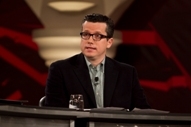
CARNE ROSS
Thanks Mr Chairman, you seem to have been doing a pretty good job speaking for the motion for our side of the table already. [laughter]
TIM SEBASTIAN
I don't think Sir Richard Dalton thinks that.
CARNE ROSS
I tease. Greetings. If governments told the truth we would not need Wikileaks, but unfortunately, because they do not, we do need it. I know this not from academic study or observation, I know this from direct personal experience. I was a British diplomat working on Iraq for several years for the British government. That government did not tell the truth to its own people, it exaggerated the case for war, it ignored available alternatives to war, parliament failed to scrutinize the government, so did the press, we need something more. The leaked cables reveal a devastating picture of governments saying one thing to each in secret and quite another to their own publics, particularly here in the Middle East. Presidents lying to their parliaments about US military attacks in their own countries. Intelligence chiefs plotting to destroy opposition groups in their own countries. Almost no decision is better for being formulated, or conducted, in secret. Before resigning from the British Foreign Office I worked on some of the most difficult and sensitive issues in foreign policy, Afghanistan, terrorism and Iraq, and my experience showed me that far too much is kept secret - covering up both good, but also bad. The phenomenon of Wikileaks will, I hope, make governments think again, I'm quite sure that they're all busy re-checking their security and gluing up the USB slots in their government computers. But it won't work. Electronic information is far easier to reveal than the earlier kind, we are in truth all vulnerable to Wikileaks. Instead governments should at last realise the necessary truth that what they do in private should match up to what they say in public and for this pressure we have to thank not our parliaments, nor our congresses and nor, Tim I'm afraid, the press, we have to thank Wikileaks.
TIM SEBASTIAN
Could you come to a close please.
CARNE ROSS
I urge you to support the motion.
TIM SEBASTIAN
Thank you very much Carne Ross. What about those people who are damaged by Wikileaks, what about them, what redress do they have? 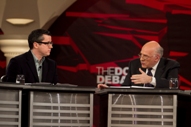 CARNE ROSS
CARNE ROSS
There's no evidence that anybody has been damaged.
TIM SEBASTIAN
Yes there is, I mean Morgan Tsvangirai the embattled prime minister of Zimbabwe is facing an investigation which could result in a full scale prosecution and a death sentence if he's found guilty, that's pretty damaging isn't it?
CARNE ROSS
It was already well known that Morgan Tsvangirai was plotting against, quite correctly, plotting against the Mugabe Government and he's already been tried for it and the Wikileaks cables doesn't reveal anything new in that regard.
TIM SEBASTIAN
And Afghanistan, the release of the tribal elders, names of tribal elders, community members who met the United States and NATO forces, no danger to them at all?
CARNE ROSS
Well, there you have a point, I must say, I think Wikileaks could have done a better job in redacting and editing the information to make sure no harm's done.
TIM SEBASTIAN
It's not: ‘could have done a better job', I mean this is not a parking offence, this is people's lives we're talking about. I mean you may say, ‘Oh could have done a little better here', it's people's lives, if they're out there to do good, this doesn't do it does it?
CARNE ROSS
I think the obligation to do no harm and to be accountable and to be transparent applies as much to Wikileaks as it does to governments.
TIM SEBASTIAN
But how can it apply to a bunch of internet cowboys who put out whatever they feel like?
CARNE ROSS
I think we're just beginning to have this debate, I think this kind of openness is going to be with us from now on, there will be more and more Wikileaks, there will be more and more disclosures of this kind.
TIM SEBASTIAN
It could well go the other way couldn't it, it could well go the other way?
CARNE ROSS
Let me finish. I think we need to develop a moral code and set of norms and understandings about how these things should be conducted.
TIM SEBASTIAN
So Wikileaks in its current form you don't like, it's not the be all and end all?
CARNE ROSS
I think its imperfect but it is a response to the fact that people have been lied to by their governments for the last ten years in particular and it is a crude response to that, but a necessary one.
TIM SEBASTIAN
Let me put the same question to you that I put to Sir Richard Dalton. How would you get, ever, a source, a confidential source, to trust you with information if it could be given out to Wikileaks and broadcast around the world? They simply won't do it.
CARNE ROSS
Well, in all candour, and I've written 80,000 words in a book about this very subject, I don't think diplomacy is a very honest business and it should be more honest and less duplicitous and it should be more transparent.
TIM SEBASTIAN
You seem to be talking yourself out of a job.
TIM SEBASTIAN
I don't have a job in diplomacy any more. I resigned.
TIM SEBASTIAN
Independent, independent diplomat, that's not diplomacy?
CARNE ROSS
Well we're consultants, we advise on diplomacy we don't represent states.
TIM SEBASTIAN
Okay, you do it for money instead of your government.
CARNE ROSS
Not very much money.
TIM SEBASTIAN
All right, Carne Ross thank you very much indeed. Could I please ask Scott Gilmore to speak against the motion.
Scott Gilmore
Speaking against the motion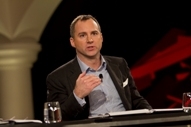
SCOTT GILMORE
I have to say I was concerned about debating Sir Richard, but now I'm terrified about debating you.
TIM SEBASTIAN
Okay.
SCOTT GILMORE
But I can still confidently say that the world is not a better place because of Wikileaks. Wikileaks gained fame by revealing horrible collateral damage in Iraq. But ironically it's now creating that same collateral damage of its own, hurting innocent people. The recent cable gate dump harms not only US diplomats, but the thousands of human rights activists and opposition leaders who talk to diplomats. I can say from my own experience that those brave people that are willing to share information with foreign diplomats can put their lives at risk, and do die, and people will die because of the cable releases. But don't take my word for it, Amnesty International called for Wikileaks to not publish the cables, concerned that it would needlessly harm innocent activists. How did Julian Assange respond to this? He told them to go stuff themselves. Now Wikileaks is also going to erode accountability, in The United States and around the world, the laws made by the people and those people elect, democratic institutions such as courts and parliaments maintain checks and balances and decide what should, or should not, be kept secret. Wikileaks has now taken it upon themselves to play this role, to decide what the public can and cannot see. The power to decide what is justifiably secret used to belong to you, the citizens of democratic governments; Assange has taken that from you. Now, note I say democratic governments, because Wikileaks is not revealing the secrets of totalitarian states, ironically Assange is seeking to harm those nations which are already the most open and the most transparent. Wikileaks began as a whistleblower of terrible wrongs, but now is merely vandalising diplomacy. The documentary dumps are making it more difficult for ambassadors to do their jobs, to talk confidentially with foreign people and governments and as a result the world is less diplomatic and less open. This is because Wikileaks is a symptom, it is not a cure, it is a symptom of the understandable frustration felt around the world by people who are rightly demanding more openness from our governments. But arbitrarily revealing secrets in this unaccountable fashion, on this industrial scale, is not the cure. It makes the situation worse by forcing governments to record less, share less and hide better. So let me close with the words of Private Bradley Manning who [allegedly] gave the US diplomatic cables to Wikileaks, he said his leak would, and I quote: ‘Bring worldwide anarchy, it's beautiful and horrifying'. Those are not the words of a transparency activist who is seeking to make the world a better place.
TIM SEBASTIAN
Could you come to a close?
SCOTT GILMORE
Those are the words of an arsonist. Please oppose this motion.
TIM SEBASTIAN
Scott Gilmore thank you very much indeed. What kind of arsonist is it, in the shape of Julian Assange, who approaches the US State Department, specifically the US embassy in London, and offers to share the information and get suggestions from them about who might be endangered by this information? They turned him down flat. 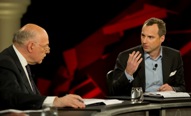 SCOTT GILMORE
SCOTT GILMORE
Well he's an inconsistent arsonist, because he has made that offer and he's...
TIM SEBASTIAN
They turned him down flat, they turned him down flat. So who has the responsibility for damaging life, where does that lie, with them or Julian Assange? He tried, he knocked on the door, they turned him away.
SCOTT GILMORE
He tried, and did they turn him away or was it a negotiating tactic suggesting to him, that assuming he had some sort of moral guidance or moral point there, would he recognise that people would be hurt and they were demanding he would do the right thing?
TIM SEBASTIAN
All they said to him in their letter, November 27th 2010: ‘Despite your stated desire to protect those lives, you have done the opposite and endangered the lives of countless individuals'. They turned him down flat, instead of taking part in a process.
SCOTT GILMORE
The State Department also doesn't negotiate with terrorists, and in a way this is a form of terrorism.
TIM SEBASTIAN
This is terrorism?
SCOTT GILMORE
This is old school anarchy, this is Julian Assange being open and just trying to reduce...
TIM SEBASTIAN
How is it terrorism, to give us information about what's been going on in Iraq? You said an interesting thing, you said that information used to lie with the people. Did it? How much information were the people given on Iraq? They were lied to consistently about the presence of weapons of mass destruction.
SCOTT GILMORE
Before Wikileaks came out we found out they lied, and in fact in the United Kingdom, or yesterday, Prime Minister Blair was held accountable for that, he was stood before a court, basically of the people, to be held accountable.
TIM SEBASTIAN
To be held accountable? He barely answered a question. We had the unenviable spectacle of the committee that was inquiring into Iraq unable to get access to two letters between President Bush and Tony Blair which they'd quoted from extensively in their memoirs. Isn't that ridiculous?
SCOTT GILMORE
Everyone at this table and everyone in this room knew that those lies took place before Wikileaks did so much damage to the international diplomatic system. We knew that and those people were being held accountable.
TIM SEBASTIAN
We knew it from leaks.
SCOTT GILMORE
We knew it from whistleblowers, this is not whistle blowing, this is vandalism.
TIM SEBASTIAN
If Wikileaks doesn't leak, what other opportunities have we got? We have a history of governments who over the last 10, 15, 20 years are lying to their people.
SCOTT GILMORE
Absolutely, but of the 250,000 people that are being...
TIM SEBASTIAN
You admit it.
SCOTT GILMORE
I admit that whistleblowers have a moral obligation to stand up to that sort of thing, and Carne did the right thing when he said that.
TIM SEBASTIAN
Are you sure you're on the right side of this debate? Made you should cross over.
SCOTT GILMORE
But he did not let a quarter of a million cables go.
TIM SEBASTIAN
All right, Scott Gilmore thank you very much indeed. The motion before the house: ‘This House believes the world is better off with Wikileaks'. We're going to take your questions, gentleman up there in the blue shirt, get a microphone to you please.
Audience questions
AUDIENCE (M) Thank you, I have a question for Mr. Ross, you say that you are supporting the motion, you are saying that the world is better off, but at the same time you are saying Wikileaks should have done a better job in filtering, or not saying the whole truth because the truth might harm some people. I give an example, an example of Afghanistan because I'm from Afghanistan, Wikileaks only released information to just show the relation between Hamid Karzai and his former vice president, but showed no proof that his brother, Ahmed, I mean Wali Karzai, he's been corrupted and he's been receiving the money as well. Don't you think that showing half of the truth actually is harming more people than not knowing the truth at all?
Thank you, I have a question for Mr. Ross, you say that you are supporting the motion, you are saying that the world is better off, but at the same time you are saying Wikileaks should have done a better job in filtering, or not saying the whole truth because the truth might harm some people. I give an example, an example of Afghanistan because I'm from Afghanistan, Wikileaks only released information to just show the relation between Hamid Karzai and his former vice president, but showed no proof that his brother, Ahmed, I mean Wali Karzai, he's been corrupted and he's been receiving the money as well. Don't you think that showing half of the truth actually is harming more people than not knowing the truth at all?
CARNE ROSS
I think it's a very good question, I think we need the whole truth and we need to examine that. One of the problems with Wikileaks is, of course, it's only a partial account, but the cables from Afghanistan are, nevertheless, very devastating because they show the Karzai government brazenly refusing to address corruption at the request of the US government.
SCOTT GILMORE
What are they not saying, what is Julian Assange not allowing us to see? 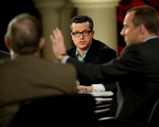 CARNE ROSS
CARNE ROSS
That's a good point, I agree.
SCOTT GILMORE
This is the fundamental problem, it's not a problem, it's the fundamental problem.
CARNE ROSS
So you're saying there should be full transparency, we should see all the cables.
SCOTT GILMORE
No, I'm saying that we should take, in the case of the democratic states, like the United States, those democratic and accountable institutions that we all have in place, those checks and balances and use them.
CARNE ROSS
Scott it doesn't work, it didn't work in the case of Iraq, I've testified to Congress and I've testified to Parliament and the questions are not good enough, they don't hold governments to account.
CARL FORD
Listen, that's just pure rubbish, in Arkansas we say that's a load of BS.
TIM SEBASTIAN
Okay, why?
CARL FORD
That's your opinion.
CARNE ROSS
It's not my opinion, it's my experience. 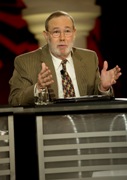 CARL FORD
CARL FORD
I was involved in this process and I know that the mistakes were made because people didn't make the right decision, not because they were trying to lie to people. You can be wrong, the fact is that weapons of mass destruction was simply a mistake by the intelligence community.
CARNE ROSS
That's ludicrous.
CARL FORD
And that they were only repeating what the intelligence community said. That's a fact.
CARNE ROSS
Sir, you may wag your finger at me, but I worked on this subject for four and half years, I read the intelligence every single day and the case for war was exaggerated.
CARL FORD
But that's not the point.
CARNE ROSS
What is the point then? That the truth was not revealed, it was not found out by parliaments before the war? That's why we need these cables out. 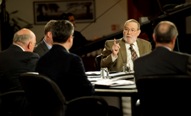 CARL FORD
CARL FORD
But whose fault was that? It was the intelligence community in the United States fault.
CARNE ROSS
And where's the accountability for them?
CARL FORD
Well, they did not do a good job, and they should be blamed for that. The fact is...
CARNE ROSS
It's a little late for that isn't it?
CARL FORD
Well, it's kind of late for you to say all of this stuff. I was there, I don't remember you speaking up at the time. 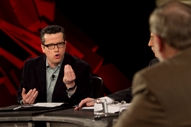 CARNE ROSS
CARNE ROSS
I resigned over the war sir, I resigned.
CARL FORD
I resigned too fellow, so this is not something that you can be the soul of the world, the fact is that there were mistakes made in Iraq, there were things that were done that I think were horrible, the torture, much of the other things that went on. But to argue that the United States government can't be trusted, has lied to us.
CARNE ROSS
I argued about my own government if you listen carefully. 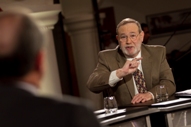 CARL FORD
CARL FORD
Well, I have more respect for the British government apparently than you do, the fact is that this is one of those cases where every government in the world has to honour privacy, if they don't people won't talk to them. That's a fact.
CARNE ROSS
Privacy over truth? I don't think so.
CARL FORD
No, no, no, it's not a matter of truth, if someone tells you something to pass onto the President of the United States and says: ‘But please don't tell anybody', what are you going to do?
CARNE ROSS
That was not the case, it's not that simple in WMD, there was vast amounts of intelligence data which said very clearly over and over, the same thing, that there was no threat from Iraq.
CARL FORD
That's not true, that's not true.
CARNE ROSS
That intelligence was then massaged to claim a threat. I read that intelligence sir, I was part of the assessments.
CARL FORD
I wrote the intelligence. 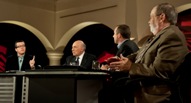 CARNE ROSS
CARNE ROSS
I went to UK/ US meetings on Iraq every quarter for four and a half years and we began every one of those meeting by saying the same thing, containment is working, Iraq is not a threat.
SCOTT GILMORE
But if you're right this doesn't mean that Wikileaks is going to make the world better, we have a democratic system in place and as your Winston Churchill said, it's a horrible system, but it's the best system we've got. The choice that we're being offered here tonight is between choosing a form of anarchy, or at least trying to work within a system that's worked pretty well so far, and is working in the UK.
TIM SEBASTIAN
Okay, we could argue, very passionately, here at the table for a long time, but I think we want to bring the audience in. Gentleman in the second row there, you've got a question.  AUDIENCE (M)
AUDIENCE (M)
Okay, so good afternoon. I believe that Mr. Carne Ross simply said it from the beginning, if governments told the truth we wouldn't need Wikileaks. We the people are the citizens, are the ones who choose our leaders in our countries during voting, if we don't know the truth behind our leaders and their plans in the future then what's the point? The real thing is that they're only showing us one side of reality, the biased side. So, in my opinion Wikileaks tells us the truth.
TIM SEBASTIAN
Okay, Scott Gilmore do you want to respond to that?
SCOTT GILMORE
Democracy is a mess, it's a messy house, it's a house with a leaky roof and all sorts of problems and floors that are falling down...
TIM SEBASTIAN
Doesn't have to be full of lies though does it?
SCOTT GILMORE
Well, some houses are. But what we're offered here is a choice, Julian Assange and Private Manning and others, they want to blow this house up, they genuinely want to bring down the diplomatic system. And what we're proposing on this side of the table is that it's a bad system, but we can make it better. We can rebuild that house, we can use democracy to challenge, like is happening in London right now, the mistakes.
CARL FORD
Rather than destroy it. He says himself that that's his purpose. He's not trying to have more openness and transparency, he's hoping that we tighten up, he hopes that people can't communicate between governments, that's exactly what he wrote, that's what his objectives are, and if you agree with those fine, but that's a different issue.
TIM SEBASTIAN
Sir Richard Dalton I'd like to bring you in. 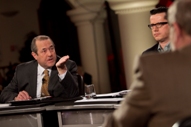 SIR RICHARD DALTON
SIR RICHARD DALTON
You're quoting very selectively from what he said, which is why I quoted his very careful words that transparent government tends to produce just government. And I'm sure you would agree with that. But the point is that we have a difficulty facing US diplomats at the moment, we do not have anything like the kind of anarchy, or vandalism of the diplomatic system that you are alleging. Why? Because it will be in the interests of all those informants and all those foreign governments to continue to deal with the United States.
CARL FORD
I think you're being naive.
TIM SEBASTIAN
I want to bring the gentleman from the audience back in, if you've still got the microphone. Are you impressed by what you've heard? 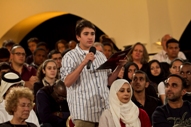 AUDIENCE (M)
AUDIENCE (M)
Well I don't really think so because the whole point of my question is that we're choosing the leaders and the leaders don't show us the real plans they're wanting for, then why are we choosing them?
TIM SEBASTIAN
Why don't you elect different leaders then?
AUDIENCE (M)
It's all the leaders and the governments in different countries that... 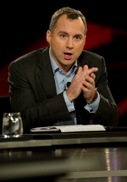 SCOTT GILMORE
SCOTT GILMORE
Then you should run for politics, you would make a fantastic leader.
TIM SEBASTIAN
We've given you something to think about, I'm going to move on. Gentleman in the fourth row, you sir in the white. Can you tell us where you're from please?
AUDIENCE (M)
I am Mahmood and I'm from the Cambridge school, I was just going to ask..
TIM SEBASTIAN
No, but which country?
AUDIENCE (M) I am from Jordan. For Mr. Carl and Scott, you were saying the Wikileaks is a terrorist act. It's not terrorism, terrorism is for killing innocent people and it's not a terrorist act to give information out, it's like you're just calling all the news channels, CNN and Al Jazeera and Al Arabiya and you're just calling them, because they're giving information, you're calling them terrorists. It's not a terrorist act to give out information, you're just giving information to the public, information that shouldn't be hidden from the public.
I am from Jordan. For Mr. Carl and Scott, you were saying the Wikileaks is a terrorist act. It's not terrorism, terrorism is for killing innocent people and it's not a terrorist act to give information out, it's like you're just calling all the news channels, CNN and Al Jazeera and Al Arabiya and you're just calling them, because they're giving information, you're calling them terrorists. It's not a terrorist act to give out information, you're just giving information to the public, information that shouldn't be hidden from the public.
TIM SEBASTIAN
Carl Ford.
CARL FORD
Well, I thought that was directed at somebody else, but I think that I understand completely people's concerns about not being told the truth by their governments. That's something that all of us object to and that we should hold our governments to a very high standard and that's why we elect officials, that's why we set up elaborate procedures to oversee what the executive branch and what the president is doing. Is it failsafe? No. But the intention is to make sure that the information that the people of the United States need to know to make good decisions, they know. If there are things 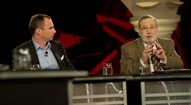 that would undermine their national security we sometimes say that it's better that we keep it secret. The American people, by the way, agree with that. They know that there are some things that could hurt us.
that would undermine their national security we sometimes say that it's better that we keep it secret. The American people, by the way, agree with that. They know that there are some things that could hurt us.
AUDIENCE (M)
If you're trying to keep it secret, you know people outside in the US and Canada and Australia, they don't really know what's happening in Palestine, they only know one side of the story. They don't know the killing of innocent people.
CARL FORD
That's certainly not true in the United States. 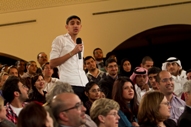 AUDIENCE (M)
AUDIENCE (M)
This is what Wikileaks is trying to do, they're just trying to give the other side of the story which the governments hide.
CARL FORD
Well I think that the people of the United States hear that story loud and clear from not only its government officials but from its press and media.
AUDIENCE (M)
I disagree. 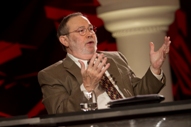 CARL FORD
CARL FORD
The fact is that they may not tell it exactly like you want them to. They may not be as sharp or as accurate as you would hope they would be but the fact is that I'll put the United States and its openness and its transparency up against any country in the world. If we are bad then everybody else is worse because we share more information...
TIM SEBASTIAN
That's not a great recommendation is it? Scott Gilmore you wanted to add something.
SCOTT GILMORE
I said Wikileaks is a form of terrorism and it sounds absurd doesn't it, it sounds over the top. But think about it, this is a group of people who are trying to change the way that governments act and behave and they're doing it through sort of illegal actions, they're trying to scare people into changing their behaviour, and innocent people are going to be hurt.
CARNE ROSS
What actions have they performed?
SCOTT GILMORE
Private Manning [allegedly] stole... 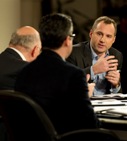 SIR RICHARD DALTON
SIR RICHARD DALTON
He's not a member of Wikileaks, this is a fundamentally important distinction. I support the right of Wikileaks, as a journalistic organisation, to reproduce materials...
SCOTT GILMORE
Don't call them journalists.
TIM SEBASTIAN
Can we just let him speak, you've had a lot of time, please.
SIR RICHARD DALTON
To reproduce material they are given. There is no distinction in that respect between The New York Times, Der Spiegel, The Guardian and Wikileaks.
SCOTT GILMORE
And guns don't kill people, people do.
SIR RICHARD DALTON
I do not condone the stealing of government information by the perpetrator. But, as with the Pentagon papers, and other issues, there can be a higher purpose served if indeed other procedures haven't succeeded in righting injustices.
CARNE ROSS
I think there's something very important to say to Scott Gilmore and other people who talk about Bradley Manning, assuming that he's the perpetrator of this, we only know one side of the story about his involvement, and in a democracy and a rule of law system, a man is entitled to the presumption of innocence before he is tried. And I think it's very important that we respect that in this case.
SCOTT GILMORE
You're absolutely right Carne, absolutely right.
TIM SEBASTIAN
Let's take a question from the gentleman in red on the right please. %20Student%20in%20red%20jumper.jpg) AUDIENCE (M)
AUDIENCE (M)
I am from Qatar and I would like to ask, just in general is it really that wrong to know the truth of what is happening in the world today? Because Wikileaks just gives us everything, they just give us the news on the internet. So is it really that wrong to tell the truth?
TIM SEBASTIAN
Scott Gilmore
SCOTT GILMORE
Diplomacy is not Facebook. Diplomacy requires a certain amount of confidentiality.
AUDIENCE (M)
Excuse me, so what, is it wrong to tell the truth? Why, we have to keep things a secret now? 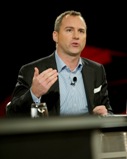 SCOTT GILMORE
SCOTT GILMORE
Sometimes we do, and we do it all in our private lives, we do it when our husband or wife gets up in the morning and puts on a horrific tie, or a horrific outfit.
TIM SEBASTIAN
Slightly different, you're talking about a government on the public's time and the public's money.
SCOTT GILMORE
Well I can build up from that analogy, the same thing happens on the macro level. Diplomacy involves being frank and fearless and we all recognise that leaders are humans and they're going to be upset by that frank and fearless advice when we say it in public. The governments, for example take China, are going to have a much better chance of getting China to treat its citizens in Tibet better if they engage them in private behind closed doors. If those cables were thrown, and perhaps they already have been, to the wind, then China's simply going to repress and work harder and lose face.
TIM SEBASTIAN (to questioner)
I'm sorry, you don't look very convinced by that argument.
AUDIENCE (M)
No.
TIM SEBASTIAN
No, okay, all right. 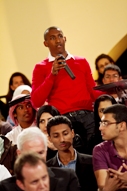 AUDIENCE (M)
AUDIENCE (M)
I have one last question, why would governments keep secrets from their citizens, I'm still waiting for that.
CARL FORD
International security interest. We're there as government officials to protect our country, to protect our people. If telling them information would harm them we make a distinction. If a country asks us, tells us something that's important for us to know and understand but tells us not to tell anybody, we honour that. We do not tell secrets when we're asked not to.
AUDIENCE (M)
Excuse me, so you're saying you're just trying to protect us from not knowing the truth at all?
CARL FORD
No, no, I think that.
CARNE ROSS
I think that's what he is saying. You're not to be trusted with the truth. 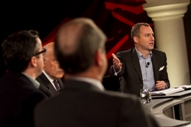 SCOTT GILMORE
SCOTT GILMORE
No, but that's not true, because governments are the people, what we're talking about here is the damage Wikileaks is doing.
CARNE ROSS
That's the whole problem, the whole problem.
TIM SEBASTIAN
Okay, let Carne Ross have a say, let Carne Ross have a say.
CARNE ROSS
I think there's an assumption here which needs to be tested or at least questioned which is the assumption that governments need privacy in order to conduct their business. That trust needs to be earned by government, it should not be automatic. And that fact is, over recent years, with the abuses that we've seen, that trust has been lost and governments need to restore that trust. But it is not something that is automatically given by us, the people, we give governments the right to do what they do in our name, it's not automatic.
SCOTT GILMORE
Carne, if you believe that then I challenge you here and now to put up on Wikileaks all international, or independent diplomats, private briefings for the Western Sahara cause. Would you be helping the people of the Western Sahara when you negotiate on their behalf with the government of Morocco, if you were to put up on Wikileaks all of your confidential briefings?
CARNE ROSS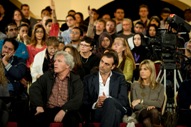 It's a great example Scott, I love that example, because I'd actually be very pleased. What we advised the Polisario Front is very open, I'm very open about that. But what Wikileaks has shown us actually is that the occupation of the Western Sahara by Morocco is a corrupt practice. There's a detailed telegram from Rabat showing how the King of Morocco corrupts his own army to stop it mounting coups against him. And the best place to be corrupt, the most lucrative posting for Moroccan army officers is the occupied territory of the Western Sahara. Bring on the transparency, bring it on.
It's a great example Scott, I love that example, because I'd actually be very pleased. What we advised the Polisario Front is very open, I'm very open about that. But what Wikileaks has shown us actually is that the occupation of the Western Sahara by Morocco is a corrupt practice. There's a detailed telegram from Rabat showing how the King of Morocco corrupts his own army to stop it mounting coups against him. And the best place to be corrupt, the most lucrative posting for Moroccan army officers is the occupied territory of the Western Sahara. Bring on the transparency, bring it on.
SCOTT GILMORE
I was a diplomat and I knew that before Wikileaks, in fact most people here knew that.
CARNE ROSS
You were a diplomat, but you weren't in the public, people did not know that and the Moroccans did not know that, the Sahrawis did not know that.
SCOTT GILMORE
I'll tell you the Sahrawis do know it. 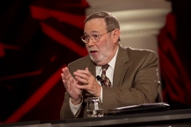 CARL FORD
CARL FORD
The result of this is not going to be more transparency for American people, this is not going to be more transparency for media around the world. Every security service in the world is going to tighten up, they are going to watch people much closer, leaks are going to get smaller.
CARNE ROSS
I get the feeling you'd like that. 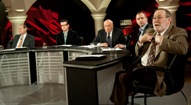 CARL FORD
CARL FORD
There won't be anything for whistleblowers to do because security is going to tighten up. And that's what Julian said he wanted.
CARNE ROSS
There are two great forces at work here, a force for transparency and a force for control and for security. And I have faith that the force for transparency will win out in this battle.
TIM SEBASTIAN
Sir Richard Dalton, want a word on this? Okay, I'm going to move on, gentleman in the second row please.
AUDIENCE (M)
Good evening ladies and gentlemen.
TIM SEBASTIAN
Where are you from please? %20Student%20in%20black%20shirt.jpg) AUDIENCE (M)
AUDIENCE (M)
I am from Yemen and my question is to the proposition. You said in your brief statement that governments should provide proper care of their citizens through transparent diplomatic communications. This applies in some cases, but to the majority it is otherwise. A local proverb says: ‘The more you know, the more headache you get', the world has enough problems already. I believe if Wikileaks did not exist we wouldn't have to be here in the first place. How is Wikileaks providing tranquillity, good living and mind comfort to the people of Planet Earth? Thank you.
TIM SEBASTIAN
Sir Richard Dalton?
SIR RICHARD DALTON 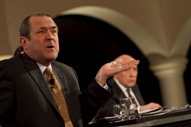 Gosh, what to pull out of that one. I return to my basic point which is that the systems which ensure transparency, don't always work, that lies and deceit take place from governments in the Middle East as well as in governments elsewhere. And if wrongs are not being righted by any other means then publicity should be called in question. So, for example, we know now a great deal more than we did before about evils that have been perpetrated in our names, or lies that have been stated in our names, and holding governments accountable so that they are warned not to do that in future is one of the responsibilities of journalists. And once this information was in the public domain, because it was stolen, then I maintain the right of Wikileaks, like the right of other newspapers in the Middle East as elsewhere, to report on that information.
Gosh, what to pull out of that one. I return to my basic point which is that the systems which ensure transparency, don't always work, that lies and deceit take place from governments in the Middle East as well as in governments elsewhere. And if wrongs are not being righted by any other means then publicity should be called in question. So, for example, we know now a great deal more than we did before about evils that have been perpetrated in our names, or lies that have been stated in our names, and holding governments accountable so that they are warned not to do that in future is one of the responsibilities of journalists. And once this information was in the public domain, because it was stolen, then I maintain the right of Wikileaks, like the right of other newspapers in the Middle East as elsewhere, to report on that information.
TIM SEBASTIAN
Did you see those lies being perpetrated by your own government when you served them?
SIR RICHARD DALTON
I was very unhappy about the issue that was raised over Iraq, I wasn't able to assess the information in anything like the detail that Carne was, because my job was to try and represent my government and people to a foreign government.
TIM SEBASTIAN 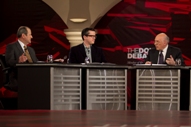 But you didn't hear the government saying things and say to yourself that's simply not true?
But you didn't hear the government saying things and say to yourself that's simply not true?
SIR RICHARD DALTON
I didn't, no.
SCOTT GILMORE
And Sir Richard, you make the point, and your opening remarks hinted at this as well, is that the oversight mechanisms don't always work, but they work a vast majority of the time and what we're faced here is we've the choice of using Wikileaks to basically knock down a system that none of us are happy with, but is actually working fairly well.
CARNE ROSS
Scott, they've failed in the most grievous circumstances, the most serious case of war. War is the most important thing that government does in our name and transparency and accountability and indeed democratic institution have failed us in recent years.
TIM SEBASTIAN
I want to bring back the questioner here. 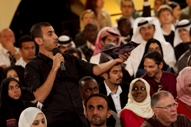 AUDIENCE (M)
AUDIENCE (M)
The proposition said very valid points, but my point here as a citizen of a country, how is this going to help me, you know give me a, just help me, give me comfort in my mind, give me tranquillity.
TIM SEBASTIAN
Do you mean comfort or information?
AUDIENCE (M)
Well, as a citizen; if you are trying to provide proper care for your citizen, you care about them, you care about how they live, like someone, maybe in some countries my vote or my voice won't make a big difference. So how is this going to help me as just a normal citizen trying to live a good life, trying to have, you know, not worry about this mess as I said earlier.
TIM SEBASTIAN
Okay, Carne Ross?
CARNE ROSS
Well, all I would say is that open transparent government is a good thing in its own right, perhaps to make it material, perhaps to make is specific, I hope that one thing that Wikileaks may mean is that in future governments will not go to war on a false basis and that you, for example, or your children will not be called up to fight and lose their lives in these wars. Isn't that a good thing?
AUDIENCE (M)
Maybe.
TIM SEBASTIAN
Okay, lady in the third row there, get a microphone to you and if you'd tell us your name please. %20pakstani%20girl.jpg) AUDIENCE (F)
AUDIENCE (F)
I am from Pakistan. I'd like to address my question to those speaking for the motion, how do you explain the deaths of a tribal elder in Afghanistan who is killed because of his associations with liberal parties are revealed because of Wikileaks.
TIM SEBASTIAN
Sir Richard Dalton.
SIR RICHARD DALTON
Has that happened?
AUDIENCE (F)
Their names have been revealed, like people that are affiliated either with US or pro-liberal societies in Pakistan, then their names are revealed and they are in danger now. 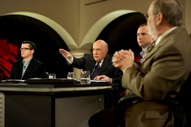 TIM SEBASTIAN
TIM SEBASTIAN
The question was, back from Sir Richard Dalton, was whether you know of any firm cases where that has happened.
AUDIENCE (F)
Where they've been killed? No. But that their names have been revealed.
TIM SEBASTIAN
Sir Richard.
SIR RICHARD DALTON
That would be appalling if it happened, my case rests on the fact that the balance of Wikileaks account is a good one. I do not support everything that they have done. Some things that they have done have been wrong but overall, looking at this particular motion, I do believe that the world is better off with Wikileaks. That doesn't mean to say that some dreadful things will not happen as a result of Wikileaks, but remember where we started which was with the statements by both Carne and myself about the significance of the Iraq and Afghanistan war logs in educating our peoples, both those who have suffered and those who have inflicted the suffering, about the scale of civilian casualties attendant on military operations.
CARNE ROSS
I think to add to what Richard said, I think there were some cables that clearly should not have been released, and I do thing the same standards that we apply to governments should be applied to Wikileaks, do no harm. For instance there were cables detailing the defences of Spanish nuclear sites, in detail, information that is not really of any public benefit, but is certainly of interest to potential terrorist attackers. And I think there were fairly clear examples, and perhaps the one you mentioned is another one, where information should not have been released. 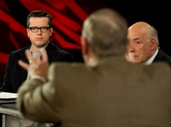 CARL FORD
CARL FORD
Where do you draw the line, who is the one that makes that decision that some of these things are good and some are bad?
CARNE ROSS
I think, myself, it's very clear, where the discrepancy between what governments are saying in public and what they are doing in private, that's where we need Wikileaks. If governments said and did the same thing in private as what they're saying about it, there wouldn't be a problem, in fact the cables would be very boring and we wouldn't even be having this debate.
CARL FORD
We wouldn't need diplomats. It's a case in which for centuries diplomacy has been an essential part of the international system, and I understand it's not perfect, that sometimes everybody would like to know everything that's going on. But if it's not in their interest to know and they're trying to protect something from happening. For example, I think the Iranian, anybody that's negotiating with the Iranians now over nuclear weapons is going to have more problems. The Brits, the Europeans, the Americans, because everybody is going to be tightened up and this is going to help all of the bad guys in the world because...
CARNE ROSS
I don't think that's clear at all.
CARL FORD
Well you don't think that but the fact is that it is...
CARNE ROSS
You're just making a big assumption there, I don't think...  TIM SEBASTIAN
TIM SEBASTIAN
I want to hear what the questioner thinks, whether you think Wikileaks has gone too far. Can you stand up again and you have the microphone.
AUDIENCE (F)
Well I think that liberal supporting people in Afghanistan are very few and that if they're killed or tortured and then killed as a result of Wikileaks disclosing information about their whereabouts or their affiliation then yes they have definitely gone too wrong and they've resulted in the death of someone who could have broken the Taliban rule or something.
TIM SEBASTIAN
Have you learned anything of interest from Wikileaks?
AUDIENCE (F)
Yes, but I don't think the cause should be the death of pro-liberal society people.
TIM SEBASTIAN
Okay, I'm going to take a question from the woman behind, yes you, please.
AUDIENCE (F)
Hi, my question is for the opposition. You've been talking about diplomacy all this time...
TIM SEBASTIAN
Excuse me, where are you from?
AUDIENCE (F)%20Qatari%20girl%20Student.jpg) I'm from Qatar, you've been talking about diplomacy this whole time, first of all I'd just like to point that United States is all about freedom of speech and freedom of press and being truthful and people should have the right to speak out and say whatever they want. However with all the wars that are being fought today, such as the war in Iraq, you cannot possibly say that without Wikileaks, or something that would show the people the truth, that these people would not be harmed. More people are dying because they're not finding out the truth about the reasoning behind these wars that are happening, and if you're saying that the United States has been spying on UN officials, I think that that's something that the people deserve to know.
I'm from Qatar, you've been talking about diplomacy this whole time, first of all I'd just like to point that United States is all about freedom of speech and freedom of press and being truthful and people should have the right to speak out and say whatever they want. However with all the wars that are being fought today, such as the war in Iraq, you cannot possibly say that without Wikileaks, or something that would show the people the truth, that these people would not be harmed. More people are dying because they're not finding out the truth about the reasoning behind these wars that are happening, and if you're saying that the United States has been spying on UN officials, I think that that's something that the people deserve to know.
TIM SEBASTIAN
Scott Gilmore you're nodding in agreement.
CARL FORD
I didn't say that, and I think that spying is something that, espionage is an illegal activity by every country, every country does it. But the State Department is not an intelligence organisation, they don't spy, they're not involved in espionage. 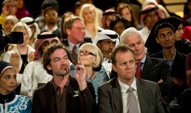 CARNE ROSS
CARNE ROSS
It was a State Department cable from Washington to the US mission at the UN, you worked, what was your title? Director of Intelligence in the State Department? Are you saying that you did not know that the US was spying on the UN?
CARL FORD
Correct.
CARNE ROSS
Well that's extraordinary. Perhaps you need Wikileaks.
CARL FORD
Not at the cost of the security of the American people. 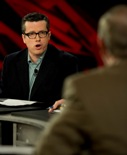 CARNE ROSS
CARNE ROSS
I don't think that the security of the American people is damaged by the revelation that US diplomats have been told spy on the UN.
CARL FORD
Why don't we let Americans decide that?
TIM SEBASTIAN
We can let Security of Defence, Robert Gates who said that the revelations were awkward and embarrassing but the consequences for US foreign policy he described as: ‘Fairly modest'.
CARL FORD
I agree, but the problem is that the...
CARNE ROSS
Scott Gilmore said it was anarchy...
CARL FORD
I'm saying that the information itself is not so damaging, it's the process that's been impacted. The fact is that people will not share information, people will tighten up their security procedures, they will not be as open, they will not be as transparent, and that's going to hurt everybody. 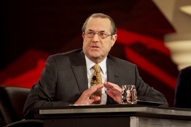 SIR RICHARD DALTON
SIR RICHARD DALTON
Then why is the State Department saying to Congress that there has been little long-term damage to US interests if what you're saying is true?
CARL FORD
Because they're talking about the actual information that was included in the leaks, that information, I think all of us agree, there is not very much there, there are some embarrassing things, but there's certainly not a whole lot of information that people didn't already know. Some of it's interesting, but the fact is it's the process that's been hurt.
TIM SEBASTIAN
I want to go back to the questioner here.
AUDIENCE (F)
Well I don't think you completely answered my question. I was saying about the war in Iraq, obviously you don't want a lot of...
SCOTT GILMORE
I will give a shot at answering that question. I actually agree with you, honestly if a pile of Iraqi cables that sat on my desk in the weeks before the decision was taken to go to war in Iraq and it revealed that there were no weapons of mass destruction, that there were lies going on. I would have felt a moral obligation to have blown the whistle and released those cables. But that's not what's happening here, what's happening is that's one percent of 250,000 cables, the entire diplomatic system that we have built up since the Treaty of Westphalia has been eroded and our oversight mechanism in democratic states are being made more vulnerable because of this. In the case of Iraq I agree with you, but writ large is Wikileaks making the world a better place? No.
AUDIENCE (F)
I think that's just one small example though.
CARNE ROSS
I think there's a big assumption here is, that the system of diplomacy that we've had built up since 1648, or whenever, is a necessary thing in the world in its current form. It's very clear that from things like Wikileaks, but also other phenomena, the growth of trans-national movements, the growth of trans-national phenomena like climate change or indeed terrorism, that the world is changing, it's changing in a very dramatic and fundamental way and the way that governments did business to control that world to try to keep it to themselves, to try and make sure that nobody knows anything except what they really need to know and their own interests, that needs to change. That fundamental cultural moral..
SCOTT GILMORE
And nobody here disagrees with you, we need more accountability but this is not accountable.
TIM SEBASTIAN
On a rare moment of unity I'm going to go to the next question, the gentleman in the second row there please. Qatari%20student%20in%20thoub.jpg) AUDIENCE (M)
AUDIENCE (M)
I'm from Qatar. Governments have to learn from their mistakes, but instead they lie and hide their information and repeat this over and over again. As we know history repeats itself and therefore we have to break this cycle and act to these preparations. We must question who are governments protecting from the truth, themselves, their reputation or the people. I would agree that this is for their own public reputation.
TIM SEBASTIAN
Carl Ford would you like to respond to that?
CARL FORD
Well, one of my duties at Georgetown was to teach a course on executive branch decision making, and I used conflict situations as examples and the fact is that the Iraq War has more unclassified information for scholars and students to look at than almost any other war that's ever occurred. That fact is that every mistake the US made, and we made a bunch of them, is clearly stated on the record by various reporters, the fact is that the administration itself in their sharing with Bob Woodward made the admissions that they made mistakes about Iraq. So this is something, if you believe that we have been hiding something, I don't think that there's anything that went on in Iraq that hasn't been made public.
CARNE ROSS
I disagree, I disagree.
CARL FORD
Well let's have it. What was it?
CARNE ROSS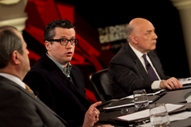 I think that we still don't know the real reason why the US and UK governments went to war. And I say that as somebody who worked as a British expert on Iraq at the UN for four and a half years and the reason I say that is because we know that the reasons they gave, the threat from WMD, were not true. We don't know what the real reason was.
I think that we still don't know the real reason why the US and UK governments went to war. And I say that as somebody who worked as a British expert on Iraq at the UN for four and a half years and the reason I say that is because we know that the reasons they gave, the threat from WMD, were not true. We don't know what the real reason was.
CARL FORD
But that wasn't what the intelligence community was telling them.
CARNE ROSS
No, that's not true.
CARL FORD
They were telling them that there was WMD.
CARNE ROSS
It's interesting that Blair has refused to release the private correspondence between him and President Bush in advance of the war.
SCOTT GILMORE
But this gentleman was actually asking about why governments lie and whether Wikileaks is going to stop that. But the insidious irony of Wikileaks is they're not focussing on the governments that do the most lying. They're focussing on the governments that are the most open, the most transparent, the most accountable. They're harming not only innocent people but institutions.
TIM SEBASTIAN
And the most powerful.
AUDIENCE (M)
But they're still telling the truth, they're not lying.
TIM SEBASTIAN
His point is that Wikileaks is not lying. Wikileaks is putting out true information.
CARL FORD
Well being wrong is not a lie, some people make mistakes, they sincerely believe things, but they're wrong, they don't have the right information of simply their experiences, their cognitive world view is off kilter with people and they make mistakes, they do bad things. Almost always, not because they were trying to do it, they were trying to do good, but simply didn't make a good decision.
SCOTT GILMORE
Absolute truth, absolute transparency is something that nobody in this room actually believes in. I don't like the suit Carne bought today, but I'm not going to tell him that, ‘cause it's going to hurt his feelings.
CARNE ROSS
You just did.
TIM SEBASTIAN
Carne Ross you wanted a quick word on this.
CARNE ROSS
I think it's a very interesting question, I think the ultimate ideal is actually transparency, I mean not of every detail, not of every kind of personal message between people. But actually full transparency would make the world a better place. 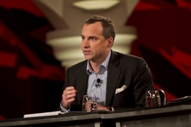 SCOTT GILMORE
SCOTT GILMORE
Would Sir Richard have left Iran and British-Iranian relations better if on his last day had sent a package to the foreign ministry in Tehran with all of his notes?
CARNE ROSS
I think you're making a false case because to talk about it in individual episode in the current dispensation would undoubtedly be disruptive and perhaps even harmful, but actually the goal here is a much greater culture of transparency. Clearly that's my hope of what Wikileaks will produce and why I support the motion, is that it will actually force governments to be more transparent. They will be vulnerable and I agree with you too, that every government should be vulnerable to Wikileaks and I think Wikileaks is in fact the greatest threat to the most repressive governments. Interestingly in a debate I took part in the other day it was a Chinese academic who said this: ‘Wikileaks is the greatest threat to oppressive governments'. And I think Wikileaks says a worse story about...
SCOTT GILMORE
You're talking about a theoretical threat to the Chinese Government.
CARNE ROSS
Let me finish for a second. Wikileaks tells a worse story about many of the governments that the US is talking to than it says about the US itself.
TIM SEBASTIAN
Okay, I'm going to move on, lady in the second row. %20Suadni%20girl%20in%20red.jpg) AUDIENCE (F)
AUDIENCE (F)
Good evening everyone, I'm from Sudan. So my question is, as a normal person I believe that actions speak louder than words, whatever is in the documents of Wikileaks are just words. So we've seen the bad actions, we've seen that side, what about the good actions, so what after we know all of this, what's going to happen next? I think the trend now is the truth is good after bad things have happened. So what about the future? What about truth for the future, not for the history?
CARNE ROSS
I think we need to change our demands to government, I think that one of the consequences of all of this is that the relationship between people and government needs to change. I think one of the strangest things about the last few years and indeed the culture of government and people that we've had, even in democracies, is that we leave these things up to government to do on our behalf, and I think that's a false compromise, a false pact on our part. We need to demand more involvement, we need to demand more voracity and transparency before the act, not afterwards as you say.
AUDIENCE (F)
But one thing, one thing. You want to change diplomacies, you want new system, but you want a new system that will start with something wrong, with a leak, with stolen information. What good base is that? 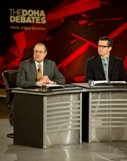 SIR RICHARD DALTON
SIR RICHARD DALTON
No, certainly not, no. The system that we have always got accustomed to is going to continue. Yes, some contacts may not speak to you as representatives, but if the United States representatives can assure those contact that, yes, the State Department and the Defence Department are not going to collude to take no care of official secrets in their possession, which is, in effect what they did through the extensive Defence Department network, which allegedly Mr. Manning had access to. If the US representatives can assure their contacts that secrets are going to be kept, as they do have to be kept in certain negotiations, for example, then I believe that we will see the Wikileaks episode, with respect to the diplomatic system, as a very embarrassing episode rather than as a fundamental change. So yes to more transparency, yes to citizens being more eager to demand explanations from their governments. Why, for example, has the member states of the GCC adopted such a different position in public to the one they've adopted in private about their relationships with Iran? The citizens of GCC member states should be asking their representatives that. So maybe for the sake of a quiet life, to go back to one speaker, individuals don't want to get involved, but those individuals and those families, and those tribes and those communities have representatives and those representatives are already involved in the public affairs of your countries.
TIM SEBASTIAN
Is there always going to be a need for Wikileaks in your view?
SIR RICHARD DALTON
Wikileaks will provide a service as will other newspapers...
TIM SEBASTIAN
To keep governments honest, to look over their shoulder?
SIR RICHARD DALTON
To help keep governments honest, yes.
SCOTT GILMORE
And who keeps Wikileaks honest? This is the fundamental difference, we agree with what you're saying that we need more accountability.
CARNE ROSS
This is the comparison that comes up over and over again.
SCOTT GILMORE
Carne I'm giving you a chance and then you have to let me go uninterrupted here.
TIM SEBASTIAN
Let Scott Gilmore talk.
SCOTT GILMORE
I agree with you that we all want a more open government, we want more accountability. But Wikileaks is not going to do that for us, Wikileaks, ironically, is giving us less accountability, it's causing governments to become more closed and more secret. And it's giving the right to decide what should, or should not, be a secret to an unaccountable NGO or to the night editor of a Spanish newspaper.
CARNE ROSS
They're apples and oranges Scott, they're completely different things. Governments wage war, they kill people, they employ people...
SCOTT GILMORE
Wikileaks is going to end up killing people when it releases the information out.
CARNE ROSS
Let me finish now, Wikileaks doesn't wage war, I think different standards of accountability and transparency apply to them. I rather agree that they need themselves to be much more transparent.
SCOTT GILMORE
Sir Richard made this point earlier.
CARNE ROSS
But it's different, it's a fundamentally different moral order than keeping governments transparent.
SCOTT GILMORE
Sir Richard made this argument earlier, and ironically it's an argument you hear in the United States with the National Rifle Association. What you're saying is the Wikileaks doesn't kill people, it's people like Manning, or the information that's killing people, but in fact, just like the NRA says it's not guns that kill people, it's people that kill people. Wikileaks is a weapon it's also the cause of the damage that's being done.
TIM SEBASTIAN
Just for the record we have no evidence that anybody has been killed as a result of a Wikileaks disclosure.  SCOTT GILMORE
SCOTT GILMORE
But the people that are going to be harmed, that are going to die of this, we're not going to read about it, it's not going to be in Wikileaks, The Guardian's not going to write about it, it's going to happen in a little village in Sudan, it's going to happen somewhere in North Korea.
CARNE ROSS
I think the press are all over this, particularly in the US, and quite rightly, people are looking for these examples where it can be proven that Wikileaks has caused harm. But we do know that governments have caused harm, I mean wars on false premises have killed tens of thousands, if not hundreds of thousands of people. I think this is frankly a more serious thing, it is weighing up what we're doing here.
SCOTT GILMORE
Absolutely it's so serious we need to change our governments, not just in Canada and the United States but around the world to prevent Iraq from happening again. Wikileaks is not going to be the tool that prevents that, more democracy is going to be the tool.
CARNE ROSS
I hear no proposals from your side of the table about how to do that, it's all a defence of the existing status quo, and that status quo has brought us terrible crimes.
TIM SEBASTIAN
Gentleman in the second row, I'm going to move on here. Man%20in%20glasses.jpg) AUDIENCE (M)
AUDIENCE (M)
I'm from England. My question is for the opposition of the motion in that living in England, living in the western world we hear how democratic the western world is compared to GCC and places like that. My question is that don't you think that one of the pillars of democracy is that everybody should have access to all the information, the government should have access, the people should have access to all the information. If you just allow government to choose what information it can release, what information it can keep in itself, then that creates a ruling elite. It's like George Orwell's novel Animal Farm if I can use that as a parody.
TIM SEBASTIAN
Okay, Carl Ford do you want to respond to that? 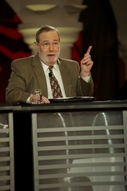 CARL FORD
CARL FORD
Well we like our representatives to oversee the freedoms that we're giving up to the executive branch and that clearly we don't want them to lie to us, we don't want them to abuse their powers. If they do, I think we have a pretty good record of even going after presidents who do things that are off the track. So it's not so much that we're not telling everybody everything, I would argue that in the case of Iraq, I know my colleague believes that it was purposely tricked, the American people were tricked.
CARNE ROSS
I didn't say that.
CARL FORD
They were lied to.
CARNE ROSS
I didn't say that, I was just talking about my own government. Don't misrepresent me. Also I didn't say they were tricked, I said that the case for war was exaggerated, I'm very careful with my words, unlike like you.
CARL FORD
Well I disagree also with whether they were, exaggeration means that you purposefully use information to make a point. All I'm saying is that I don't doubt that President Bush and others wanted to go to war in Iraq and they'd made up their mind about that, but the intelligence community is the bad guy here because they made it possible for them to get away with it. If we had said what we were saying, what we should have said, is they could never have gone to war. So the fact is that the American people were told things, the intelligence community told them that Iraq had weapons of mass destruction: ‘Trust us, we know what's going on'. Or as George Tennant, a friend of mine said: ‘It's a slam dunk'. The fact is they truly, sincerely believed that.
TIM SEBASTIAN
Let's bring Carne Ross in here briefly. 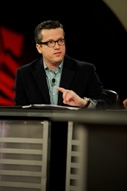 CARNE ROSS
CARNE ROSS
Well perhaps I should use another example because the WMD argument is getting a little tired. The example I would use is I worked on sanctions against Iraq, I was the diplomat for the British who negotiated many of the resolutions that the Security Council that enforce sanctions on Iraq, and I did so safely in the knowledge that I would never be asked questions in my parliament, or by the press, or held accountable for what I did. And we did considerable harm to the Iraqi people, harm which I now greatly regret, and I think we would have made better decisions if we had done so in greater transparency, and if we had known that we would be held personally to account for what we did. But in truth we didn't feel that, I felt that we were completely oblivious to public pressure, that we would never face proper scrutiny. And until I resigned I was absolutely right, I was only scrutinised after I resigned.
SCOTT GILMORE
But Carne, your argument for absolutes, there's an Aristotelian mean that we need here, a balance between more transparency, more openness and effectiveness. You asked shouldn't, in a democracy, all information be open and free? Well no, your tax returns shouldn't be, your healthcare records shouldn't be.
TIM SEBASTIAN
Who owns this information, who does it belong to?
SCOTT GILMORE
It belongs to the people, through their elected representatives.
TIM SEBASTIAN
Through the elected representatives? 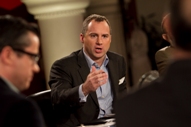 SCOTT GILMORE
SCOTT GILMORE
We all have the right to use and abuse it.
CARNE ROSS
I disagree with Scott, it's interesting in the US where I work and I live and my children are American, I want to make clear I'm very fond of America, despite the failing of government in that country. As an NGO, which works with other foreign governments, we're required to file all of our contracts, and indeed the details of how we run the organisation. If you look on the web you can see how much I'm paid, you can see our detailed contracts with our clients around the world. And actually that's a very good discipline for us because it mean we think crikey, we have to be really clear, and really honest and really consistent about what we're doing. And I think that discipline is frankly one that should be applied much, much more widely.
SCOTT GILMORE
But again, that's a question of more transparency, but not full transparency.
TIM SEBASTIAN
Okay, I'm going to move onto a final question, gentleman in the third row, yes you, please.  AUDIENCE (M)
AUDIENCE (M)
Good evening. I'm originally from Iran but I've lived all my life here in Doha. My question is to Mr Carl Ford and Scott Gilmore, if you found out that 9/11 and the economic crisis and all the big events that happened in this world, was done by the US government and Wikileaks showed you that, would you still be against Wikileaks?
CARL FORD
Yes.
SCOTT GILMORE
We would be for whistle blowing but against Wikileaks.
AUDIENCE (M)
Would you rather live in a lie instead of knowing the truth?
CARL FORD
Of course not, the idea that governments can't keep anything private is an assumption that I don't think any government in the world accepts as practical. It would be great if every citizen in the United States knew everything that everybody else knew. But most of us recognise that we couldn't get anything done, we couldn't make our government function if everybody was putting their two cents forth.
TIM SEBASTIAN
But that's a pretty big anything isn't it that he's talking about?
AUDIENCE (M)
Yeah it's pretty big events that happened. People died from these and you said you don't want to know the truth.
CARL FORD
But I knew the truth about Iraq. I think that we told the truth as we believed it at the time to the American people. Now there are other people that don't think that or other governments might have done different, but we weren't making up stuff to convince people to go to war. The fact is our bad work made that point, but it wasn't done on purpose, it wasn't done because we were trying to fool the American people, we were trying to be honest with them.
TIM SEBASTIAN
Carl Ford, why did the head of British Intelligence, MI6, Sir Richard Dearlove, come back from a meeting in Washington and inform the British cabinet that the intelligence in Washington was being fixed around the policy, if there was no attempt to exaggerate the case for war?
CARL FORD
Because I think that from outward appearances, given that many questions that there are about weapons of mass destruction, that anyone should be suspicious of what went on there.
TIM SEBASTIAN
That was more than suspicious, he said that the intelligence was being fixed.
CARL FORD
But fixed means that if, when I was in the intelligence community, when he was there, and he was...
TIM SEBASTIAN
That means distorted, that's what it means.
CARL FORD
No we were telling it...
TIM SEBASTIAN
Distorted and assembled to suit a political argument, that's what he meant.
CARL FORD
But we weren't doing that, we were telling him...
TIM SEBASTIAN
So he got it wrong did he?
CARL FORD
No, no we were telling our government what we truly believed, if that was wrong it's our fault and I apologise, we got some things wrong.
TIM SEBASTIAN
You'd still rather know more than less?
AUDIENCE (M)
Did you see the video that's been uploaded by Wikileaks? The video about what happened in Iraq, will you still say you don't want to know the truth?
SCOTT GILMORE
Listen, I'll take your hypothetical a step further, if the release of Wikileaks articles...
TIM SEBASTIAN
That wasn't hypothetical, he was talking about the helicopters, a very specific 2007 incident.
AUDIENCE (M)
There are big events that happen in this world and you only know one side of the story.
SCOTT GILMORE
What this side is arguing is that we need more accountability, we need more transparency, we need whistle blowing, but Wikileaks is not the tool to do that, it is a weapon of mass destruction on its own, it is damaging the democratic system and the diplomatic system at the cost of great...
TIM SEBASTIAN
Sir Richard Dalton you were shaking your head there.
SIR RICHARD DALTON
Because I haven't succeeded in persuading him that actually, according to the State Department, the system is going to continue more or less as it was in protecting United States interests.
SCOTT GILMORE
That was one statement by State Department and one statement by the Defence Secretary, who frankly are going to want to try to limit the expectations and reduce the affectation of damage considerably. But in my personal conversations with acting diplomats, both British and American right now, they are quite frank about saying that it has hurt them, and it has damaged them.
TIM SEBASTIAN
Okay, we are... I'm sorry, you wanted to make one further point.
AUDIENCE (M)
I just want to say one last thing, I'd rather live in a life, or a world, that will tell me the truth instead of just closing my eyes and just believing what people tell me. 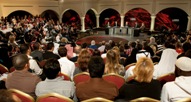 TIM SEBASTIAN
TIM SEBASTIAN
Okay, in the little time we have left I'm going to ask each of you just for a very, very brief ten second summary. Sir Richard Dalton.
SIR RICHARD DALTON
It's in the interest of all of us citizens to know more about what is done in our names, so please support this motion.
TIM SEBASTIAN
Carne Ross.
CARNE ROSS
I think this is ultimately a battle between truth and control and I think the crisis that we find ourselves, particularly here in the Middle East, but also globally, demands that we take back the truth.
TIM SEBASTIAN
Scott Gilmore.
SCOTT GILMORE
This isn't a debate about Iraq and we all agree we need more openness and transparency, but you should oppose this motion because Wikileaks is not the road to give us that transparency.
TIM SEBASTIAN
Carl Ford, very brief. 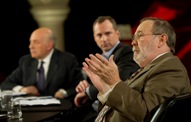 CARL FORD
CARL FORD
I think that all of us should be for transparency and that we should hold our governments to account to tell us the truth, but Wikileaks has harmed that process rather than helped it.
TIM SEBASTIAN
Thank you.
CARL FORD
People are going to know less after this than they would have if Wikileaks hadn't done its thing.
Vote result
TIM SEBASTIAN  Okay, thank you, we are now at the point where we're going to vote on the motion that: ‘This House believes that the world is better off with Wikileaks'. Let me just explain to you before you do vote, if you want to vote for the motion, that is the side represented by those on my right, you press button one, the yes button. If you want to vote against the motion, the side represented by those on my left, it's button two, the no button. Whichever button you do want to press please do it now. You only have to press once, your vote will be communicated to our computers and we should have it up on the screen for you very shortly. Just a reminder that this debate is going to be shown on BBC World News and a host of other channels across the world including widely in the United States, reaching an estimated audience of 400 million people, so you are not alone. All right, there's the result, there is the result 74 percent for the motion, 26 percent against, the motion has been resoundingly carried. All that remains for me to do is to thank our distinguished speakers, thank you very much indeed for coming here tonight. Thank you to you the audience for your questions. The Doha Debates will be back again in a few weeks time, till then, from all of us, have a safe journey home, good night, thank you, good night.
Okay, thank you, we are now at the point where we're going to vote on the motion that: ‘This House believes that the world is better off with Wikileaks'. Let me just explain to you before you do vote, if you want to vote for the motion, that is the side represented by those on my right, you press button one, the yes button. If you want to vote against the motion, the side represented by those on my left, it's button two, the no button. Whichever button you do want to press please do it now. You only have to press once, your vote will be communicated to our computers and we should have it up on the screen for you very shortly. Just a reminder that this debate is going to be shown on BBC World News and a host of other channels across the world including widely in the United States, reaching an estimated audience of 400 million people, so you are not alone. All right, there's the result, there is the result 74 percent for the motion, 26 percent against, the motion has been resoundingly carried. All that remains for me to do is to thank our distinguished speakers, thank you very much indeed for coming here tonight. Thank you to you the audience for your questions. The Doha Debates will be back again in a few weeks time, till then, from all of us, have a safe journey home, good night, thank you, good night.
Watch online

